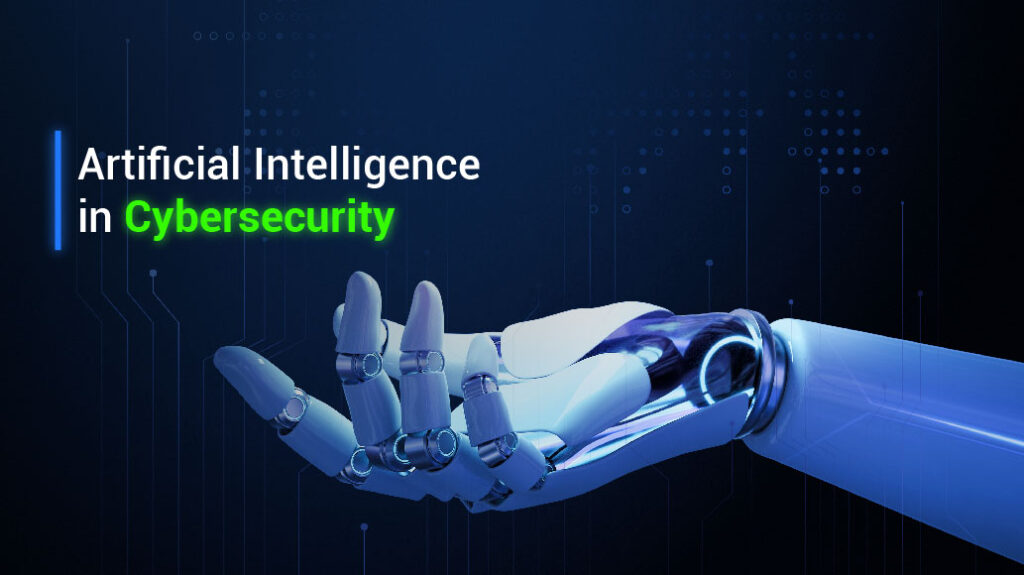Artificial Intelligence in Cybersecurity

Artificial intelligence has been a popular term in the technology sector for several years. It informs the ability of machines to learn and carry out the operation. That is typically human intelligence. such as awareness, thinking, learning, and decision-making.
Cybersecurity is a particular field where AI has a big influence. Companies are using AI-powered solutions to boost their security solutions. As the number of cyber threats rises,
AI can analyze and identify the data and patterns that may indicate potential threats.
Moreover, AI security tools can adapt to new threats. to improve its effectiveness over time. This indicates that organizations can stay one step ahead of this tricky attack.
AI is a valuable asset for cyber professionals because it can improve their capacity to defend key assets from cyber threats. And also, AI has its limitations.
Definition of Artificial Intelligence (AI)
It is the development of intelligent machines that are capable of carrying out tasks that usually require human intelligence. such as understanding natural language, detecting images, making reproach calls, and picking up new skills over time, In order to imitate intelligent behavior, including the capacity to reason, solve problems, learn from data, and adapt to new circumstances, artificial intelligence (AI) uses algorithms and computer programs. There are two categories. rule-based systems and machine learning.
Rule-based systems process information and make choices via a set of established rules and logical operations. On the other hand, machine learning involves the implementation of algorithms that can learn from data and improve their performance over time. This enables machines to find patterns, anticipate the future, and spot anomalies in huge datasets.
The Importance of Cybersecurity
Cybersecurity is the act of preventing unauthorized access, theft, and harm to computer systems, networks, and sensitive data. It is crucial for guarding against cyberattacks, maintaining business operations, and ensuring national security. As more private and sensitive data is kept online, cybersecurity aids in limiting access by people who are not authorized.
With the rise of the digital era and our continued reliance on technology, cybersecurity has become more and more significant. It is critical for people, organizations, and countries to protect themselves from cyberattacks by implementing strong cybersecurity measures.
Artificial intelligence and cybersecurity

Applications of AI in cybersecurity are becoming more and more essential. Large amounts of data can be evaluated to spot potential threats and stop harm before it starts. It is easier for security teams to stay ahead of attackers when machine learning algorithms can adapt to new threats and improve their accuracy over time.
Additionally, AI can automate a few cybersecurity tasks, releasing security personnel to work on more difficult issues. However, AI also creates new cybersecurity challenges, such as the potential for attacks utilizing AI-powered tools. While AI will become a more crucial tool in the fight against cyber threats as it expands, it is crucial to recognize and address its limitations and potential vulnerabilities.
How Artificial Intelligence is Used in Cybersecurity
Artificial intelligence is a powerful tool in the fight against cyber threats. AI-based systems can analyze a huge amount of data and identify trends and defects. AI-powered security tools are used for threat detection, incident response, and vulnerability management.
These tools can monitor network traffic, identify potential threats, and automate responses to mitigate risks. AI can also help with password management, user authentication, and fraud detection.
However, AI systems are not unbreakable and can be subject to attacks. So it’s important to make sure AI-based security tools are carefully thought out, updated regularly, and tested against potential threats.
Benefits of Artificial Intelligence in Cybersecurity
Artificial intelligence is an important tool in the fight against cyber threats compared to traditional methods. AI is much more advanced, and AI can assist organizations in detecting, preventing, and responding to security events.
- Artificial intelligence can identify risks more quickly and accurately.
- Machine learning algorithms can analyze large volumes of data.
- Artificial intelligence can help reduce errors in security alerts, allowing security personnel to concentrate their attention on actual threats.
- AI can monitor network traffic and highlight suspicious activity in order to prevent data exfiltration.
- AI can assist in locating vulnerabilities in software code and offer solutions to stop exploitation.
- AI can identify anonymous activity and inside threats.
- AI can improve the speed and efficiency of incident response by quickly identifying the source of a problem and suggesting suitable solutions.
Challenges of Artificial Intelligence in Cybersecurity
- When using AI in cybersecurity False positives and negatives can be significant challenges.
- Security experts find it difficult to understand how decisions are made and find weaknesses in the system because AI algorithms lose transparency.
- Professionals in the fields of cybersecurity, AI, and ethics are needed to address these issues in an integrated way.
- Human involvement and knowledge are still required to monitor AI algorithms and guarantee their effective operations.
- AI algorithms must constantly adapt and learn in order to detect new and emerging dangers due to the continuous development of cyber threats.
- It can be difficult to effectively practice, evaluate, and maintain AI systems due to their complexity.
- Adversarial attacks can exploit weaknesses in AI systems, leading to incorrect results and making them vulnerable to attacks.
AI delivers significant cybersecurity issues, such as false positives, lack of transparency, and attack vulnerability. To meet these issues, a multidisciplinary strategy needs to be adopted.
The Future of Artificial Intelligence in Cybersecurity

Artificial intelligence is playing a vital role in cybersecurity. It has the ability to completely transform the sector. As the number and complexity of cyber threats continue to grow, AI-based cybersecurity solutions are emerging as a critical defense against attacks.
When technology develops, detection and response to threats will become more advanced and programmed, which speaks well for the future of AI in cybersecurity.
Machine learning algorithms can identify hazards and take the necessary precautions to minimize them by spotting patterns and defects in massive amounts of data.
AI is utilized to enhance network and system security. AI-based authentication systems can more effectively and successfully verify user identities, minimizing the possibility of unauthorized access to crucial data and assets.
One of the key challenges is the shortage of skilled professionals who can develop and maintain AI-based security solutions. To ensure that the technology is utilized properly and ethically, concerns about the potential for AI to be ruled over or hijacked by cybercriminals must also be addressed.
The application of AI to cybersecurity is on the horizon as well, the technology has the potential to change how companies secure their systems and networks.
In order to ensure that the advantages are realized and the technology is utilized responsibly, it is necessary to address the challenges that are related to AI adoption.
Advancement in Artificial Intelligence

Many sectors, including cybersecurity, are being transformed through developments in artificial intelligence. AI has the potential to completely change how organizations identify and stop cyber threats.
The development of machine learning algorithms, which allow AI systems to learn from data and get better over time, is one of the most important developments in AI. As a result, cybersecurity technologies based on AI are better able to identify risks that were previously undiscovered and adapt to new attacking strategies.
The field of cybersecurity has made significant progress due to AI developments, and the technology has enormous potential to enhance threat detection and response capabilities.
It is expected that the cybersecurity sector will continue to benefit from AI’s innovations as it develops new applications and continues to evolve.
Potential Risks and Concerns
While developments in artificial intelligence have the potential to transform the cybersecurity sector, they also give rise to concerns about potential risks and threats.
The following are some of the main dangers and issues associated with using AI in cyber security:
- Over-reliance on AI
- limitation of AI
- Data Privacy
- Bais and discrimination
- manipulating by cyber criminals
To ensure that AI is used ethically and effectively in the battle against cyber dangers, it is essential to address these risks and worries. Organizations must be aware of the limitations of AI-based solutions, maintain traditional security measures, and ensure the safety and attack resistance of their AI-based cybersecurity instruments.
To prevent unexpected results, ethical considerations should also be made while creating and implementing AI-based solutions.
Conclusion
AI has completely transformed the cybersecurity environment. It has become an important tool for identifying and reducing dangers due to its capacity to swiftly detect anomalies and analyze massive amounts of data.
AI can help security teams stay one step ahead of cybercriminals, given the growing sophistication of cyberattacks. However, it’s crucial to keep in mind that AI cannot take the place of human intelligence and expertise and is not a perfect solution. Effective cybersecurity solutions must be created using both AI and human intelligence. It is crucial to ensure that AI is utilized ethically and transparently, with the proper controls in place to protect user privacy, and that unintended effects are avoided as the use of AI in cybersecurity continues to develop.
